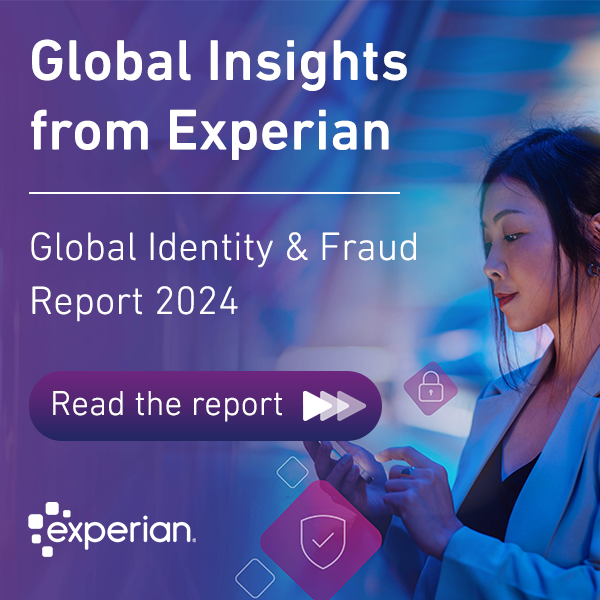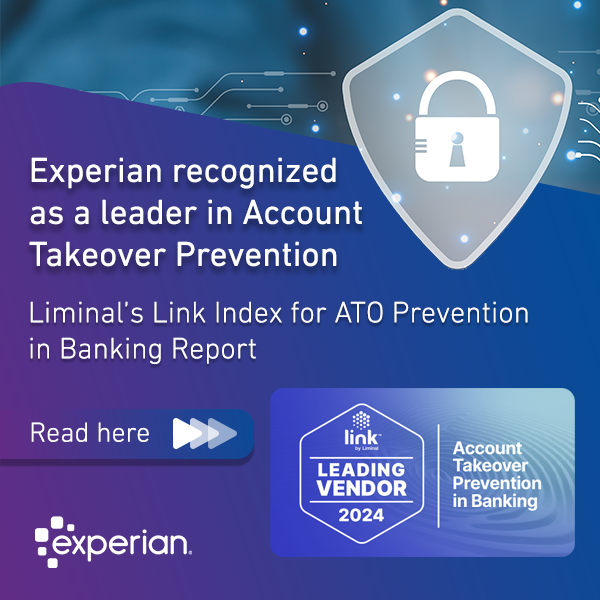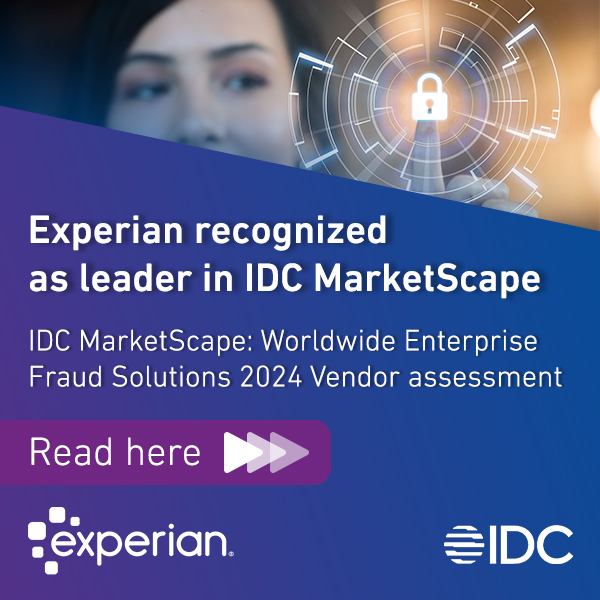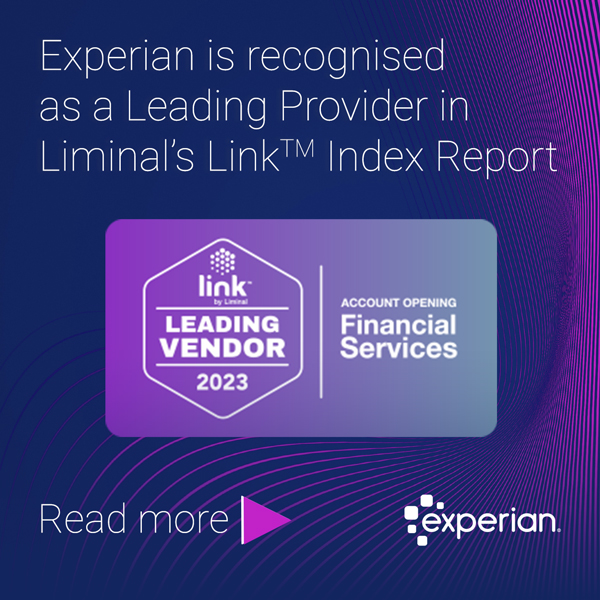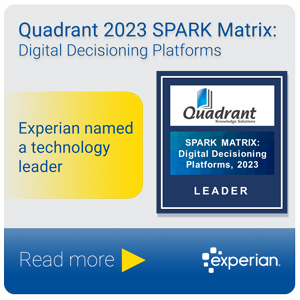All posts by Managing Editor, Experian Software Solutions

Digital interactions have been the norm for some time, and have recently accelerated due to the pandemic, surfacing digital identity as a fundamental focal point for businesses. A shift from analog identity to digital is happening organically due to digital demand, but the necessity of safeguards from businesses and policymakers, and an understanding of what it means to have a digital identity from consumers, make this a complex and increasingly important topic. "Sometimes it's easier to think about analog and how that might relate to digital. Our analog life, our identity, is pretty straightforward. We're all used to showing a driver's license, an identity card, or a passport. It's been authenticated by somebody that we trust like the government. It's something that we use as an entry point to open up our first checking account at the bank or when we go to the doctor's office and we provide insurance and our identity. In the digital world, it's very similar. If you think about that provenance or that trusted source of identity, it often starts with some things that we don't even see. That digital footprint is growing and expanding into a lot of pieces of information that most of us aren't familiar with or think about. That data becomes the gateway to how we access goods and services in a digital environment." Eric Haller In this CXO Talk, Michael Krigsman asks Eric Haller, Executive Vice President and Group Head of Experian DataLabs, what it means to have a digital identity and why it's important. They take a look at the following topics: What is digital identity? How do you establish digital identity? How to improve digital identity? How can we protect against AI-generated deep fakes? What is the intersection of digital identity and GPT-3? Blockchain and digital identity Societal implications of digital identity Advice to businesses and policymakers on digital identity

There's been lots of discussion about what a return to normal will look like as we transition out of the global pandemic—and much remains up the air. However, our recent consumer and business surveys paint a picture that merits the attention of financial service and credit companies. The big takeaway: The Covid-19 crisis has bifurcated consumers, created extremes on both sides. On the one hand, many individuals coming out of the pandemic have more cash than they had going in. The crisis didn't impact their income, and instead, they've spent the year spending less than they usually would due to work-from-home mandates and local lock-downs. Our consumer survey from January 2021 shows that financial challenges have eased for younger consumers and higher-income households. Yet, at the same time, there's also a contingent of consumers who continue to struggle. One in three of our survey respondents reported that they still have financial concerns and a similar percentage are worried about their employment. We anticipate that the demand for support, service, and credit will be high from each side. So how can companies respond to the heightened need for credit products while continuing to service consumers who may need support? This is where digital solutions make all the difference. By employing digital onboarding and decision automation tools, you can rapidly increase your capabilities while also improving the online customer experience for all. A return to spending The U.K. provides a glimpse of what a staggered return to normalcy may look like. When shops and restaurants re-opened for business in mid-April, lines of people streamed out the doors and flooded the streets. With the country's re-opening culminating in June, many consumers will be looking to resume spending on items and projects that they've neglected since the pandemic's start. For example, our survey data reveals that consumers are becoming less cautious with their finances in general. Fewer people report that they're cutting back on discretionary spending and there's a decline in consumers putting money toward emergency funds and drawing funds from savings accounts. These consumers may be gearing up to spend more. And companies that can anticipate their needs and meet them proactively will be positioned to win and keep their business. Solutions for pent-up demand Many businesses are already preparing for this new wave of demand. Consider that eight out of 10 businesses report that they're turning to cloud-based decisioning applications to improve the customer journey. In doing so, companies are giving themselves much-needed flexibility right when it's needed most. They can dial up their online capabilities based on demand and then dial down if it drops. At the same time, these automated solutions enable companies to deploy their staff to customers who do require personal attention. It's a divide-and-conquer model that keeps the customer at the center. In addition to utilizing the cloud, more than 40% of companies say they leverage AI to improve the customer experience. The AI component enables companies to provide personalized options for consumers and create customer journeys that are far more relevant. The timing for such personalization couldn't be better. In our research, a growing percentage of consumers indicate they're willing to share more personal data about themselves in exchange for improved experiences and added value. Building solutions that work—for everyone The pending volume creates a significant growth opportunity and highlights why digital solutions are a must. Companies that provide the best digital service to customers will garner their trust, loyalty, and even referrals. This yields more demand, increasing the need for scalable, cloud-based onboarding and decisioning even more. Amid this activity, you'll want to focus on getting the most from your digital tools. To do so, consider: Leveraging data for improved credit outcomes Evaluate your end-to-end customer journey, looking for ways to utilize data and increase personalization at every juncture. You'll improve the customer experience and provide more relevant offers. The right data also provides a holistic picture of customer credit risk and ensures you're not creating problems for the future. Utilizing low-code solutions so employees can dive in Digital onboarding and decision automation can be game-changing for the customer experience. But if it's hard for employees to use, then that effectiveness takes a hit. Look for solutions that your employees can use off the shelf. The ability to generate customizable reports and execute on ideas and strategies without involving IT at every turn is essential. Recognizing limitations and potential bias Evaluate your analytics models and look for areas of limitation or potential bias. You want to ensure that you're providing access to credit to all eligible customers and not inadvertently excluding specific demographics. Building capabilities that put you ahead of the market The pandemic provided many lessons—and the value of anticipating demand or potential problems was one of the most important. The crisis is waning, but the financial consequences will continue to reverberate, especially as various government aid programs come to an end. Focus on improving your analytics so that they can better describe what's happening now and predict pending changes in demand and shifts in your portfolio. By and large, consumers are moving forward after a challenging year. Prioritize your digital solutions to make sure you can meet their needs regardless of what the future holds. Stay in the know with our latest insights:

Did you miss these April business headlines? We’ve compiled the top global news stories that you need to stay in-the-know on the latest hot topics and insights from our experts. Consumers prefer 'invisible security' to passwords Using Experian's latest research, Venture Beat looks at the top three physical and behavioral 'invisible security' methods and why consumers no longer prefer visible online security such as passwords. Experian’s identity GM addresses industry’s post-Covid challenges How are CIOs and IT leaders dealing with new challenges created by the move of so much commerce from in-person to online? Information Week explores why security and identity verification are key priorities right now. Will passwords finally be a thing of the past? Consumers are more concerned about online privacy and identity theft than they were before the pandemic. CNP covers why warnings from data and fraud experts about the security of passwords have finally caught the attention of consumers. The future of secure data Eric Haller, Vice President & General Manager of Identity, Fraud & DataLabs, joins Bloomberg's Scarlet Fu to discuss the waning age of password protection and what the future of account security will look like. Consumers recognize biometrics security tops passwords, Experian says Biometric Update explores why physical biometrics like facial recognition and fingerprints are the preferred method of authentication when it comes to consumers according to Experian's latest research. Stay in the know with our latest insights:

The pandemic has enabled something close to a digital revolution, but how can businesses keep up with shifting consumer behaviors while ensuring fraud prevention is top of mind? Our latest Global Identity and Fraud Report takes a look at key consumer trends online and how businesses are responding.

In our first episode of the Women Making Waves in Tech podcast series, we hear from Shobana Balasundaram, Director of Product Management at Experian Global Decision Analytics. Shobana leads the product roadmap for PowerCurve Suite, Experian’s award-winning decisioning software platform. Shobana’s passion for introducing new solutions and product features is contagious: “During my time managing this collection of software solutions, I have had the chance to bring some advanced analytics and machine learning features to market. Indeed, some of the new product features that I have launched have driven nearly half of our revenue growth in the past few years, which confirms that decisioning software is a growing area. And I love my job!” Blending business strategy and tech advancements Shobana discusses what it takes to bring business strategy to life by applying the latest tech advancements. “It’s all about transforming an idea into a product and putting it in the hands of a client so they can deliver value to their customers,” explains Shobana. In her current role with the global product management team for decisioning software, Shobana is responsible for thinking about what kind of features to build into the product and forecasting the level of growth it will generate. That also involves addressing the market’s and competition’s reactions. But for her, the part she enjoys the most is “taking an idea, thinking about what is the possible problem you're solving and turning that into a product feature. Getting that idea-turned-into-a-solution in the hands of a client is a very satisfying experience, end-to-end.” Access all episodes of Insights in Action on Soundcloud, Spotify, Google Podcasts

The surge in digital demand over the past year reinforced the deep connection between recognition, fraud prevention, and the online customer experience. As businesses transformed their operations to accommodate the rapidly growing volume of digital transactions, consumer expectations for easy, secure interactions increased at an even faster pace. And that meant less tolerance for the interruptions caused by security and risk controls. Our 5th Annual Global Identity and Fraud Report highlights these shifts and more, drawing on three waves of data collected throughout the pandemic. The business and consumer surveys took place in waves from June 2020 to January 2021 across 10 countries spanning North America, Latin America, Europe, and Asia-Pacific. The breadth of data reveals notable changes in consumer and business behavior and priorities as each navigated the crisis. One of the many heartening discoveries included the fact that 8 in 10 businesses said that they now have a customer recognition strategy in place, up 26% since the start of the pandemic. Many companies also developed digital strategies as they strove to improve their online experience and provide security and fraud prevention measures when customers needed it most. When it comes to fraud prevention, companies are continuing to invest in securing online experiences. This is an encouraging trend, especially given that we anticipate fraud attacks will increase significantly in the near term. Here are some key consumer trends from the 5th Annual Global Identity & Fraud Report: Consumer digital trends and behaviors As of January 2021, 43% of consumers plan to increase their banking and shopping transactions in the next 12 months 60% of consumers globally have used a universal mobile wallet, a +7%-pts increase since the pandemic began and highest (66%) among under 40s 55% of consumers say security is their top priority online. This has been the case for the past 5 years of our study, with privacy (23%) second. Consumer concerns for fraud 44% of consumers globally said they were most concerned about protecting credit cards and bank account details 1 in 4 consumers (only 23%) were concerned about protecting personal data e.g. date of birth, address, and SSN or equivalent 33% of consumers are worried about identity theft compared to 28% of consumers who were worried about it before the pandemic Consumer preferences are shifting towards invisible security 74% of consumers prefer the security of physical biometrics, which is most applicable to mobile devices and include facial recognition and fingerprints 72% of consumers prefer the security of PIN codes, requiring the use of two devices, each connected to the users’ account 66% of consumers prefer the security of behavioral biometrics, which is passively observed signals across browsers/ devices requiring no effort from the consumer Even as businesses prioritize the customer experience and support, our research found that they’re still sustaining pre-pandemic levels of investment in security and fraud management. Access the report here to get more consumer trends and find out what businesses are focusing their investments to improve their customer’s digital experience, including fraud prevention.

Did you miss these March business headlines? We’ve compiled the top global news stories that you need to stay in-the-know on the latest hot topics and insights from our experts. How to build consumer trust without sacrificing the experience This Forbes article explores the relationship between brand trust and customer experience using the lastest research from Experian. Read about how simple verification methods, personalization and ensuring the use of robust ethical data practices, can be key to driving consumer trust. Using AI for digital identification, fraud prevention, and increased ROI In this IOT for all article, Eric Haller, Vice President & General Manager of Identity, Fraud & DataLabs, covers how investing in AI will not only improve customer experience but also impact a company's bottom line. Digital and online trends in a post-pandemic world Nasdaq #TradeTalks Video Broadcast Series featuring Steve Wagner, Global Managing Director of Decision Analytics, covers what we should expect to see from consumers and businesses in a 2021 post-pandemic world when it comes to digital and online. How current data-driven digital identity impacts businesses and consumers 60 percent of consumers are using a universal mobile wallet to make digital payments according to Experian's latest research. Eric Haller, Vice President & General Manager of Identity, Fraud & DataLabs, talks to CNP about how digital identity solutions that use AI and ML will reduce fraud and improve customer experience when it comes to digital transactions. The sophisticated customer and the need for adaption This Q&A in the Digital Journal with Donna DePasquale, Vice President & General Manager of Global Decisioning, looks at how businesses should respond to consumers seeking a better online experience. Stay in the know with our latest insights:

At Experian, we have a long history of driving positive change in society. For example, our founder Si Ramo was one of the original thinkers around a cashless society much like the one that we are headed to today. Indeed, everything we do today as a company is built upon a foundation of data and information technology and anchored on the mission of giving consumers access to the financial products and financial information that they deserve. All of that while enabling consumers to protect their identities and to help businesses achieve their outcomes. Experian Decision Analytics’ mission is taking the complexity out of decision-making, enabling businesses to drive meaningful outcomes for consumers in moments that matter. We achieve that by making sense of that data, by applying advanced analytics and technology in ways that help businesses better serve their customers. Cloud-based technology helps make smarter, quicker customer decisions We are committed to extending our expertise and capabilities to businesses of all sizes so they can take advantage of a range of simple, affordable, and configurable solutions. That means that what was once only available to very large businesses is available to all, and that’s better for consumers. For us, helping businesses serve the needs of more customer segments, with confidence, is paramount. Leveraging decisioning software, rich data sets, advanced analytics, and cloud-based technology, we empower customers to make great risk-based decisions quickly, easily, and safely. That translates into innovation at scale, a lower total cost of ownership for clients, and greater access to the most effective fraud protection methods. We do this to help businesses lend more effectively, minimize and detect fraud losses, and comply with regulatory and privacy requirements. But, more importantly, we do this to help them deliver great experiences to their customers. Ultimately, all of that work helps society to flourish. More resources on digital transformation and automated decision management: Fair and explainable artificial intelligence is accelerating industry transformation How digital transformation is defining a new way to do business Automating Fairness: Using Analytics to Help Consumers in Pandemic Era
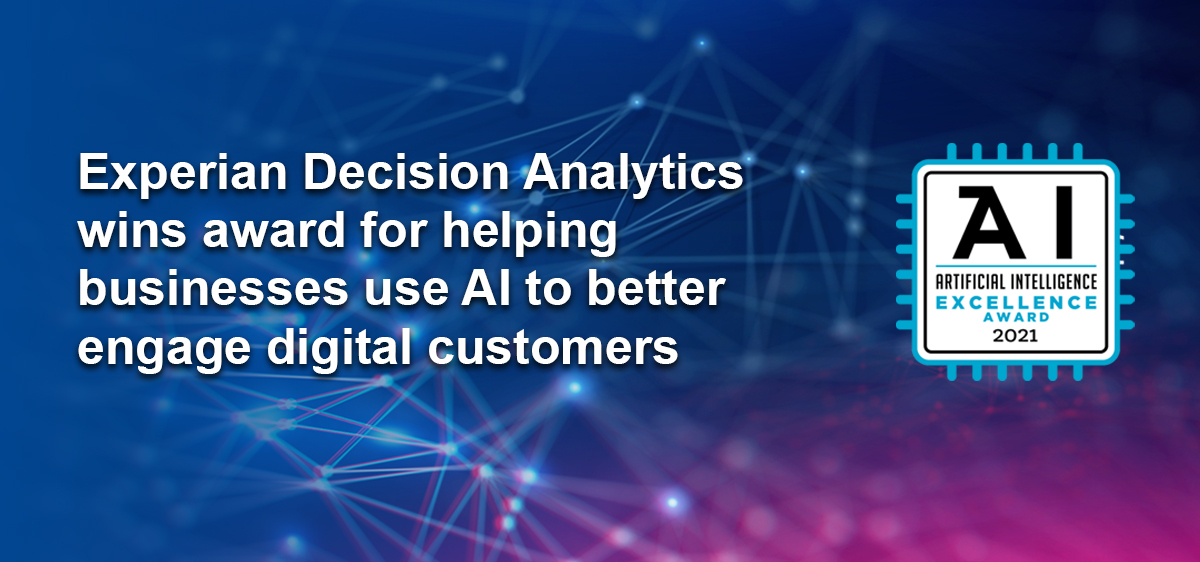
Experian is honored to be recognized as a winner of the Artificial Intelligence AI Excellence Award by Business Intelligence Group. Experian was recognized for its credit and collections decisioning solution, PowerCurve, which features intelligent agent-customer assist that processes complex, regulated, and subjective interactions with customers, revolutionizing how they digitally interact, on their terms, with lenders. This AI virtual assistant offers customers 24/7 access to support from their credit provider - on a financially sensitive transaction such as collections. We embedded over 30 years of collections knowledge and experience delivered to major clients across the globe into a credit risk decision management solution that delivers this domain expertise, data, analytics, decisioning, and workflow to clients of all sizes via cloud technology. Harnessing the power of AI has enabled lenders to easily connect with customers on their terms in a fair and transparent way, and to recover losses in an operationally efficient way but also improve customer satisfaction. When’s the last time you heard a customer share a positive story about collections? This digital self-service channel allows customers to engage with a lender on their terms and allows the lender to fulfill key objectives for quickly recovering losses, using the company’s strategic parameters for segmentation and treatment paths. The intelligent agent customer-assist feature within PowerCurve continuously learns which distinguishes it from the traditional decision-tree structure of a chatbot. It remembers interactions and learns from them, has short-term and long-term conversation goals, and recognizes small talk. It treats customers fairly and transparently. The result feels more empathetic and allows for an always-on and real-time consumer interaction. It can also offer a future-forward benefit to lenders, by allowing their employees to strategically focus on other areas of the business, potentially increasing the capacity for more credit products and services innovation. This Business Intelligence Group awards program sets out to recognize those organizations, products and people who bring Artificial Intelligence (AI) to life and apply it to solve real problems. Related stories: Going the last mile: Improving the End-to-End Digital Customer Journey Technology today: Focus on innovation drives award-winning, AI-powered consumer lending Podcast: Driving product vision with the customer front and center, a software architect’s view

As consumers shop, bank, and pay online during the global pandemic, steps are being taken to return to more business as usual. But, what should businesses expect around consumer digital preferences post-pandemic? Steven Wagner, Global Managing Director of Decision Analytics, recently spoke with Jill Malandrino of Nasdaq Trade Talks about recent survey findings and overall trends to watch out for. Here are highlights of that discussion: Research trends indicate a continued and persistent surge in online transactions and digital payment mechanisms The current environment has been a tipping point for consumer trust in online transactions A secure environment through continuous and passive authentication is key to meeting online consumer demand There is a direct correlation between consumer trust in their online environment and their willingness to provide data to secure a transaction Businesses need to invest in AI that provides a good consumer experience -- from chatbots to machine-learning models that impact consumer treatment in real-time Watch the full episode now: Related stories: New research available: 2021 Global Insights Report Parting ways with old forms of managing credit risk online Why the new era of customer experience includes passive authentication

Given market dynamics, technology today is an important topic for businesses to track — whether beginning a technology transformation journey or looking to continuously improve by understanding the latest advancements available — including AI-powered consumer lending. With innovation at the forefront of practices, our experts help power important topics around this subject — and fuel breakthrough technologies. Recently, this focus on innovation was acknowledged, with Ascend Intelligence Services™, winning both honors from The CIO 100 Awards and The FinTech Breakthrough Awards, premiere and notable programs that recognize breakthrough technology worldwide. ML technology helps drive customer satisfaction and increased bookings The CIO 100 Awards recognized Atlas Credit, a midsized lender headquartered in Texas for their use of the Experian Ascend Intelligence Platform. The platform enabled them to double loan application acceptance rates while reducing credit losses by up to 20 percent. Atlas Credit uses the tools and data to make instant decisions, resulting in improved customer satisfaction and higher booking rates. Using Ascend Intelligence Services, Experian data scientists rapidly built a machine learning (ML) custom credit risk model, optimized a decision strategy, and deployed the model in production, reducing time to impact by six months. “Winners are chosen by a team of external judges, many of them former CIOs, on their use of leading-edge IT practices that produce measurable results. The award is an acknowledged mark of enterprise excellence. This year's honorees exemplify what it means to deliver business value through the innovative use of technology. This elite group is creating competitive advantage in their organizations, improving business processes, enabling growth and improving relationships with customers," according to CIO 100 2021 winners. The CIO 100 awards are presented by IDG's CIO — the executive-level IT media brand providing insight into business technology leadership, each year, CIO recognizes the premier organizations and executives driving IT innovation with these prestigious awards. Honorees are inspiring examples of how IT leadership, business partnerships, and customer engagement are reshaping the future. Atlas Credit was the recipient of the Optimal Loan Underwriting with Machine Learning for Underserved Consumers project. Better results, delivered faster to help power FinTech evolution Experian's Ascend Intelligence Services was also selected as a winner of The FinTech Breakthrough Honors, which recognizes Standout FinTech Companies and Solutions in 2021. Ascend Intelligence Services was recognized as the FinTech Breakthrough Award winner in the Consumer Lending Innovation Award category. The FinTech Breakthrough Awards is the premier awards program founded to recognize the FinTech innovators, leaders, and visionaries from around the world in a range of categories, including Digital Banking, Personal Finance, Lending, Payments, Wealth Management, Investments, RegTech, InsurTech, and many more. The 2021 FinTech Breakthrough Award program attracted more than 3,850 nominations from across the globe. "This past year has been unlike any time period ever seen before for FinTech growth and disruption, with FinTechs maturing to become respected, global players throughout the financial services value chain," said James Johnson, Managing Director, FinTech Breakthrough. "FinTech is a digital force that has clearly entered a new phase of its evolution, moving out of niche use cases to operate at scale, and we are thrilled to recognize the 'breakthrough' FinTech innovators in this market evolution for our fifth annual FinTech Breakthrough Awards program." Ascend Intelligence Services is a fully managed analytics service delivered digitally by Experian data scientists. It helps lenders leverage advanced technology, utilizing AI to deliver better results up to 5x faster, accelerating time-to-market all while allowing them to make sound business decisions. Related stories: Insights in Action Podcast: Identifying the core capabilities your business needs to get MLOps right Fair and explainable artificial intelligence is accelerating industry transformation Going the last mile: Improving the End-to-End Digital Customer Journey

At a time when the digital transition is in full swing, accelerated by the rapid change brought by the pandemic, the role of technology architecture seems to gain a renewed importance. This discipline is all about finding solutions to the challenge at hand by bridging the gap between business needs and technological enablement. In the latest Insights in Action podcast series ‘Women Making Waves in Tech’, we hear from Aruna Chalasani, senior software architect at Experian Global Decision Analytics. In this 20-minute conversation, she talks us through her experience driving innovation in highly diversified, geo-distributed teams and shares key learnings and takeaways about driving product vision with the customer front and center. It’s all about customer enablement Aruna highlights how, over the past year, the lifespan of innovation has continued to shorten. That means a shrinking timeframe to enact innovation from a technology perspective, whether that’s migrating to the cloud, leveraging machine learning, refining the customer experience, boosting data integration, or infusing automation at scale into the business. This fast-tracked drive into the digital world has also brought an increased digital risk. Security remains paramount, and they must look at it from a holistic perspective. These new innovation parameters call for robust customer enablement – self-service keeps gaining traction as a proven way to enable organizations to meet consumer demands at the speed of change, while more and more organizations seek the benefits of cloud-based solutions and automated decision management. For technology architects, driving innovation these days is about responding to customers’ needs even quicker, yet without losing sight of security, scalability, usability, and efficiency gains. Listen to the full podcast Access all episodes of Insights in Action on Soundcloud, Spotify, Google Podcasts
